|
|
|
Sort Order |
|
|
|
Items / Page
|
|
|
|
|
|
|
| Srl | Item |
| 1 |
ID:
155370
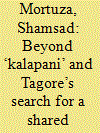

|
|
|
|
|
| Summary/Abstract |
In 1927, Rabindranath Tagore wrote a series of letters during his ‘pilgrimage’ to the countries of the Southeastern Rim of the Indian Ocean. He was convinced that India had forgotten its ‘gained’ territory that could be traced in some of the local customs and cultures. The presence of stories from the Puranas including The Ramayana and The Mahabharata led Tagore to believe in a larger imaginary Indianness outside its political realm. He held the imposition of ‘kalapani’ – the Hindu religious sanction against crossing the ocean – as a stumbling block that had eventually forced India to isolate itself. For him, without any concerted vision, it was impossible to attain true unity through ‘lip-union from public platforms’ [Tagore, R. (2010). Letters from Java (I. Chaudhurani and S. Roy, Trans., and S. Roy, Ed., p. 73). Kolkata: Visva-Bharati]. Recent scholarship has problematized the civilizing force of Indic values that Tagore expounded in his Letters from Java. However, Tagore’s call for consciousness building to rediscover and refine the common areas of Asian tradition and culture merits revisiting. Thus the paper purports to chart the cartography of the minds that once united different places and constituted a cultural capital as well as to survey the various metaphorical implications of ‘kalapani.’
|
|
|
|
|
|
|
|
|
|
|
|
|
|
|
|
| 2 |
ID:
025309
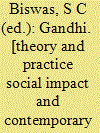

|
|
|
|
|
| Publication |
Calcutta, K P Bagchi and Company, 1969.
|
| Description |
xvi, 635p.Hbk
|
| Standard Number |
8170740584
|
|
|
|
|
|
|
|
|
|
|
|
Copies: C:1/I:0,R:0,Q:0
Circulation
| Accession# | Call# | Current Location | Status | Policy | Location |
| 031772 | 923.254/BIS 031772 | Main | On Shelf | General | |
|
|
|
|
| 3 |
ID:
133735
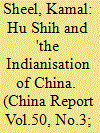

|
|
|
|
|
| Publication |
2014.
|
| Summary/Abstract |
Hu Shih was one of the most significant philosophers and intellectuals of China during the early twentieth century. As a professor of philosophy at Peking University, as a leader of the 'bai-hua' movement, and as an ideologue behind the famous May Fourth Movement of 1919, he was among the first contributors for radical ideological change and modernity in China. His article on the 'Indianization of China' presented a scathing criticism of Indian influence on China that inhibited the blooming of 'indigenous modernity', progressivism and dynamism there. Hu's views supported contemporary 'modernist' Chinese intellectuals' labelling of India under the British as a 'ruined' civilisation, 'failed' state or incapable role model for the agenda of modernity. Yet, he did not overlook affinities, mutual respect and admiration for those in India searching for 'indigenous roots' to modernity. His famous observation that 'India conquered and dominated China culturally for 20 centuries without ever having to send a single soldier across her border' is one of the most quoted sentences in any study of Sino-Indian encounters and connections. This article highlights multiple shades of Hu Shih's interpretation of India.
|
|
|
|
|
|
|
|
|
|
|
|
|
|
|
|
| 4 |
ID:
101050
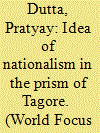

|
|
|
| 5 |
ID:
124975
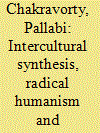

|
|
|
|
|
| Publication |
2013.
|
| Summary/Abstract |
Rabindranath Tagore imbued Indian dance and music with a new modern sensibility. He created novel and eclectic dance-and-music genres, Rabindranritya and Rabindrasangeet, when the national trend was toward classical revivalism. He inspired Indian women to dance on the national stage at a time when dance was associated with immorality and cultural degeneration. This article explores Tagore's song and dance creations, connecting them to his radical political and philosophical thought on universal humanism. Focusing on his views on creativity and freedom, nationalism and cosmopolitanism, and women and essentialism, it is argued that this eclectic intercultural synthesis of ideas served to promote individual consciousness, empowerment and cosmopolitanism without rejecting their Indic cultural roots.
|
|
|
|
|
|
|
|
|
|
|
|
|
|
|
|
| 6 |
ID:
142379
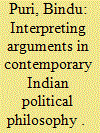

|
|
|
| 7 |
ID:
110857
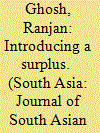

|
|
|
| 8 |
ID:
110862
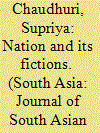

|
|
|
|
|
| Publication |
2012.
|
| Summary/Abstract |
In Rabindranath Tagore's novel Gora (1910) and Salman Rushdie's Midnight's Children (1981), literary works which employ the fiction of nativity to examine a paradoxical moment of historical origin, the idea of the nation is subjected to intolerable strain. Fables of identity are constructed in both novels, yet instead of a 'hardening' of the metaphysical idea that sustains the allegorical parallel, what we witness is a radical dissolution or disintegration of the categories of nation and narrative at the very site of their inscription. I will argue that in both works, the symbolic equation of novel and nation opens up fissures in historical experience.
|
|
|
|
|
|
|
|
|
|
|
|
|
|
|
|
| 9 |
ID:
102454
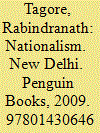

|
|
|
|
|
| Publication |
New Delhi, Penguin Books, 2009.
|
| Description |
lxviii, 87p.
|
| Standard Number |
9780143064671
|
|
|
|
|
|
|
|
|
|
|
|
Copies: C:1/I:0,R:0,Q:0
Circulation
| Accession# | Call# | Current Location | Status | Policy | Location |
| 055866 | 320.54/TAG 055866 | Main | On Shelf | General | |
|
|
|
|
| 10 |
ID:
102452
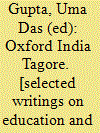

|
|
|
|
|
| Publication |
New Delhi, Oxford University Press, 2009.
|
| Description |
xxxvi, 505p.
|
| Standard Number |
9780195677072, hbk
|
|
|
|
|
|
|
|
|
|
|
|
Copies: C:1/I:0,R:0,Q:0
Circulation
| Accession# | Call# | Current Location | Status | Policy | Location |
| 055867 | 320.54/GUP 055867 | Main | On Shelf | General | |
|
|
|
|
| 11 |
ID:
110863
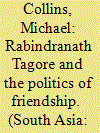

|
|
|
|
|
| Publication |
2012.
|
| Summary/Abstract |
Caught between an arrogant European modernist elite and a proprietorial Indian nationalism, Tagore challenged the spatial dimensions of modernity by critiquing both Eurocentrism and a simplistic anti-imperialism. Tagore did build bridges with some Western intellectuals and social activists but much of his life illustrates the difficulties of meaningful cross-cultural relations and the shortcomings of a liberal 'politics of friendship'. If this is in part due to the inadequacy of translation, then we need more and better translations. Rather than resurrecting a platitudinous 'cosmopolitan' World Citizen, Tagore's work should require us to think more critically about parallel modernities and different ways of imagining our futures. As China and India, perhaps above all others, grow in economic, political and cultural strength, these questions are likely to become more pressing.
|
|
|
|
|
|
|
|
|
|
|
|
|
|
|
|
| 12 |
ID:
142380
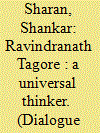

|
|
|
| 13 |
ID:
139388
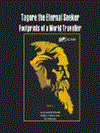

|
|
|
|
|
| Publication |
New Delhi, Vij Books India Pvt. Ltd., 2015.
|
| Description |
xvi, 397p.Hbk
|
| Standard Number |
9789382652953
|
|
|
|
|
|
|
|
|
|
|
|
Copies: C:2/I:0,R:0,Q:0
Circulation
| Accession# | Call# | Current Location | Status | Policy | Location |
| 058247 | 910.41/TRI 058247 | Main | On Shelf | General | |
| 058801 | 910.41/TRI 058801 | Main | On Shelf | General | |
|
|
|
|
| 14 |
ID:
157053
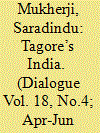

|
|
|
| 15 |
ID:
128479
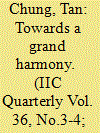

|
|
|
| 16 |
ID:
091734
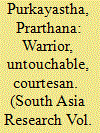

|
|
|
|
|
| Publication |
2009.
|
| Summary/Abstract |
This article analyses the intimate links between dance and the processes of national and postcolonial identity formation in India, particularly in Bengal, in the twentieth century. It examines alternative, non-classical artistic experiments in the realm of theatre dance spawned by twentieth century cultural nationalism in India, focusing on dancing bodies that actively engaged with, and wrote different meanings for, the socio-political space they inhabited. Dance-dramas written by Rabindranath Tagore in the 1930s are used as points of entry into a discourse on South Asian modernism and feminism, opening up a space in which the twentieth century representation of Indian women through bodily performance troubles notions of cultural purity and origin and offers instead 'impure' but nevertheless powerful cultural texts.
|
|
|
|
|
|
|
|
|
|
|
|
|
|
|
|
|
|
|
|
|